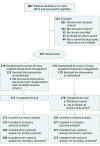Targeted Temperature Management for 48 vs 24 Hours and Neurologic Outcome After Out-of-Hospital Cardiac Arrest: A Randomized Clinical Trial
- PMID: 28742911
- PMCID: PMC5541324
- DOI: 10.1001/jama.2017.8978
Targeted Temperature Management for 48 vs 24 Hours and Neurologic Outcome After Out-of-Hospital Cardiac Arrest: A Randomized Clinical Trial
Abstract
Importance: International resuscitation guidelines recommend targeted temperature management (TTM) at 33°C to 36°C in unconscious patients with out-of-hospital cardiac arrest for at least 24 hours, but the optimal duration of TTM is uncertain.
Objective: To determine whether TTM at 33°C for 48 hours results in better neurologic outcomes compared with currently recommended, standard, 24-hour TTM.
Design, setting, and participants: This was an international, investigator-initiated, blinded-outcome-assessor, parallel, pragmatic, multicenter, randomized clinical superiority trial in 10 intensive care units (ICUs) at 10 university hospitals in 6 European countries. Three hundred fifty-five adult, unconscious patients with out-of-hospital cardiac arrest were enrolled from February 16, 2013, to June 1, 2016, with final follow-up on December 27, 2016.
Interventions: Patients were randomized to TTM (33 ± 1°C) for 48 hours (n = 176) or 24 hours (n = 179), followed by gradual rewarming of 0.5°C per hour until reaching 37°C.
Main outcomes and measures: The primary outcome was 6-month neurologic outcome, with a Cerebral Performance Categories (CPC) score of 1 or 2 used to define favorable outcome. Secondary outcomes included 6-month mortality, including time to death, the occurrence of adverse events, and intensive care unit resource use.
Results: In 355 patients who were randomized (mean age, 60 years; 295 [83%] men), 351 (99%) completed the trial. Of these patients, 69% (120/175) in the 48-hour group had a favorable outcome at 6 months compared with 64% (112/176) in the 24-hour group (difference, 4.9%; 95% CI, -5% to 14.8%; relative risk [RR], 1.08; 95% CI, 0.93-1.25; P = .33). Six-month mortality was 27% (48/175) in the 48-hour group and 34% (60/177) in the 24-hour group (difference, -6.5%; 95% CI, -16.1% to 3.1%; RR, 0.81; 95% CI, 0.59-1.11; P = .19). There was no significant difference in the time to mortality between the 48-hour group and the 24-hour group (hazard ratio, 0.79; 95% CI, 0.54-1.15; P = .22). Adverse events were more common in the 48-hour group (97%) than in the 24-hour group (91%) (difference, 5.6%; 95% CI, 0.6%-10.6%; RR, 1.06; 95% CI, 1.01-1.12; P = .04). The median length of intensive care unit stay (151 vs 117 hours; P < .001), but not hospital stay (11 vs 12 days; P = .50), was longer in the 48-hour group than in the 24-hour group.
Conclusions and relevance: In unconscious survivors from out-of-hospital cardiac arrest admitted to the ICU, targeted temperature management at 33°C for 48 hours did not significantly improve 6-month neurologic outcome compared with targeted temperature management at 33°C for 24 hours. However, the study may have had limited power to detect clinically important differences, and further research may be warranted.
Trial registration: clinicaltrials.gov Identifier: NCT01689077.
Conflict of interest statement
Figures



Comment in
-
Targeted Temperature Management After Cardiac Arrest: Finding the Right Dose for Critical Care Interventions.JAMA. 2017 Jul 25;318(4):334-336. doi: 10.1001/jama.2017.8977. JAMA. 2017. PMID: 28742888 No abstract available.
-
Finding the precision to improve outcome in patients after cardiac arrest.Crit Care. 2017 Oct 22;21(1):258. doi: 10.1186/s13054-017-1835-6. Crit Care. 2017. PMID: 29058600 Free PMC article. No abstract available.
-
Targeted temperature management after cardiac arrest: when, how deep, how long?J Thorac Dis. 2017 Dec;9(12):4840-4843. doi: 10.21037/jtd.2017.11.20. J Thorac Dis. 2017. PMID: 29312672 Free PMC article. No abstract available.
-
Temperature and duration targets during post-arrest care: choosing the right prescription for the right patient.J Thorac Dis. 2018 Jan;10(1):10-14. doi: 10.21037/jtd.2017.12.26. J Thorac Dis. 2018. PMID: 29600010 Free PMC article. No abstract available.
-
Targeted temperature management after cardiac arrest: the longer, the better?J Thorac Dis. 2018 Jan;10(1):49-51. doi: 10.21037/jtd.2017.12.13. J Thorac Dis. 2018. PMID: 29600019 Free PMC article. No abstract available.
-
Temperature Control after Cardiac Arrest. When to Start? How Long? How Cold?Am J Respir Crit Care Med. 2018 Nov 15;198(10):1331-1333. doi: 10.1164/rccm.201711-2269RR. Am J Respir Crit Care Med. 2018. PMID: 30199655 No abstract available.
-
Cooling after cardiac arrest-the longer the better?J Thorac Dis. 2018 Sep;10(Suppl 26):S3300-S3304. doi: 10.21037/jtd.2018.07.96. J Thorac Dis. 2018. PMID: 30370143 Free PMC article. No abstract available.
References
-
- Holzer M. Targeted temperature management for comatose survivors of cardiac arrest. N Engl J Med. 2010;363(13):1256-1264. - PubMed
-
- Nielsen N, Wetterslev J, Cronberg T, et al. Targeted temperature management at 33 degrees C vs 36 degrees C after cardiac arrest. N Engl J Med. 2013;369:2197-2206. - PubMed
-
- Donnino MW, Andersen LW, Berg KM, et al. ; ILCOR ALS Task Force . Temperature management after cardiac arrest: an advisory statement by the Advanced Life Support Task Force of the International Liaison Committee on Resuscitation and the American Heart Association Emergency Cardiovascular Care Committee and the Council on Cardiopulmonary, Critical Care, Perioperative and Resuscitation. Circulation. 2015;132(25):2448-2456. - PubMed
-
- Hypothermia After Cardiac Arrest Study Group Mild therapeutic hypothermia to improve the neurologic outcome after cardiac arrest. N Engl J Med. 2002;346(8):549-556. - PubMed
Publication types
MeSH terms
Associated data
LinkOut - more resources
Full Text Sources
Other Literature Sources
Medical

